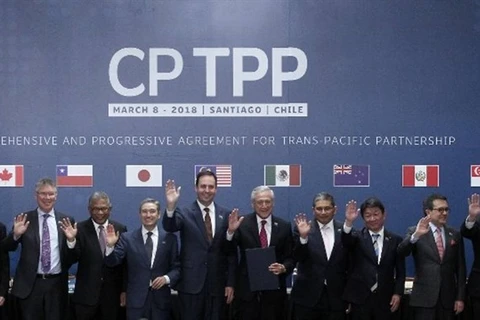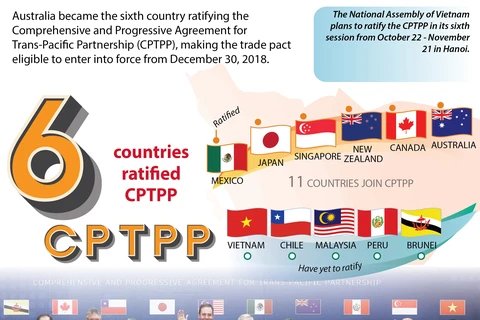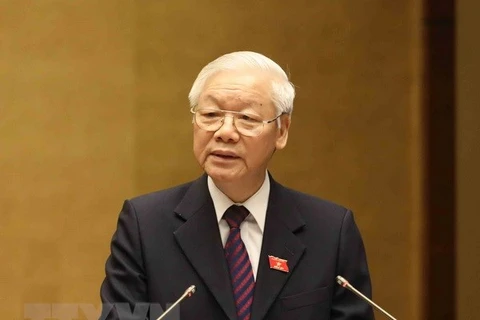Hanoi (VNA) – The Comprehensive and Progressive Agreement for Trans-Pacific Partnership (CPTPP), to be submitted to the 14th National Assembly for approval on November 2, is expected to help Vietnam expand exports and join the global value chain more deeply.
Experts have said Vietnam will face challenges caused by impacts of foreign investments on domestic firms. Vietnamese businesses should make preparations in order to make the best use of incentives offered by the deal.
Minister of Industry and Trade Tran Tuan Anh said the CPTPP is a quite comprehensive agreement as it covers principles not only in trade and investment but also in intellectual property.
It requires Vietnam to reform investment and business environment, as well as institutions, he said.
The minister added the agreement will put competitive pressure on enterprises and the economy, helping Vietnam grow more sustainably.
Pham Quynh Mai, deputy head of the Ministry of Industry and Trade (MoIT)’s Multilateral Trade Policy Department, said 66 percent of tariff lines will be eliminated immediately after the agreement takes effect, 86.5 percent three years after the deal comes into force and 97.8 percent after 11 years.
It targets not only traditional sectors like goods, services and investment but new realms such as e-commerce, public procurement, labourt and the environment, the official noted.
With a market of nearly 500 million people and 13.5 percent of global GDP, the CPTPP is a free trade agreement with strategic significance to Vietnam and the business community, as it will push for open markets, investment development and the establishment of free trade ties between Vietnam and many new partners like Canada, Mexico and Peru, thus helping restructure the country’s export markets, easing its dependence on traditional markets.
Besides, the deal will motivate the Vietnamese Government to step up administrative reform, complete the legal and institutional framework and create a more open and transparent investment and business climate, Mai said.
A survey conducted by HSBC in six out of 11 CPTPP member countries, namely Australia, Canada, Malaysia, Mexico, Singapore and Vietnam, revealed that about 63 percent of Vietnamese enterprises believe the agreement will positively impact their business.
Minister Anh said experience from Vietnam’s joining the World Trade Organisation (WTO) and the Vietnam-US Bilateral Trade Agreement shows that Vietnam can limit adverse impacts if the country knows how to utilise opportunities and take initiative in realising its integration commitments.
He stressed that such sectors as services, post and telecommunications, e-commerce, garment-textile and leather and footwear are forecast to grow under the CPTPP.
On the contrary, the sugarcane cultivation and sugar industry is expected to face great challenges due to its slow pace in restructuring, he said.
Luong Hoang Thai, head of the Multilateral Trade Policy Department, also pointed out challenges regarding quality of exports and high-quality labour force, saying fierce competition will take place not only in markets of CPTPP member countries but also in Vietnam.
Given this, experts suggested Vietnamese businesses learn more about the agreement to grasp Vietnam’s commitments and markets of partners, while building and changing their business plans for mid and long terms.
Besides, they should seek partners in other CPTPP member markets to benefit from their financial strength and technology transfer, thus gaining more opportunities to integrate more deeply in regional and global supply chains, the expert said.-VNA

Canada announces official ratification of CPTPP
Canada has filed its notice of ratification of the Comprehensive and Progressive Agreement for Trans-Pacific Partnership (CPTPP) with New Zealand which acts as the depository country overseeing the deal’s implementation.























